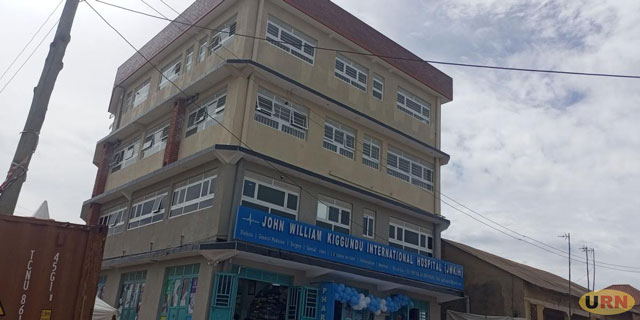
Wakiso, Uganda | THE INDEPENDENT | State Minister for Industry David Bahati has promised that the right incentives and tax relief will be given to ensure that Wakiso District hosts the biggest dialysis centre in the country – the JWK International Hospital.
The JWK International Hospital was commissioned last week, but officials said the facility is struggling to get to full capacity because it is struggling to clear various tax demands from URA.
Bahati, who commissioned the hospital on behalf of Health Minister Dr Jane Ruth Aceng, admitted that local authorities should do more to support the faciltiy in areas of taxes, electricity and road network.
He said he would ensure the hospital gets all the aid it needs from the government, including that URA releases the three ambulances immediately.
Bahati also hailed the investor, who had been working in the US, for the venture which he said was driven by the need to serve his country and not make a profit. He called on the hospital to focus on non-communicable diseases, mental health and child mortality.
The minister specifically noted that the dialysis department is one of the largest in the country, adding that the facility would go a long way in saving people from seeking medical services outside the country.
JWK International Hospital is one of several investments in Uganda and the US in the fields of healthcare, home care services, pharmaceuticals, and hospitality, under Lukwago’s bigger organisation, Angels Mission Home Care Services based in the US.
He named the Kakiri Hospital after his father, John William Kiggundu, now 97.
The facility in the centre of Kakiri Town along the Kampala-Hoima Road, is a 50-bed hospital with an initial three dialysis machines. The plan is to increase them to 10.
The 5-year plan as revealed by Dr Henry Lukwago, the CEO and Chairman Board of Directors, also involves expanding it to 150 beds as well as offering services tailored for the low-income population around it.
However, the sh 2 billion facility opened without its ambulances and other vital equipment that were still being held by the Uganda Revenue Authority for tax purposes. He wondered why he had been forced to pay taxes on every piece of medical equipment despite the laws saying otherwise, in addition to the red tape in the government agencies.
He called on the government and other partners to join in helping make the project bigger.
Lukwago also expressed disappointment with the local government officials as well as the electricity authorities over their unwillingness to facilitate infrastructure upgrades to ease the operations of the hospital.
He explained that he wanted to fix the road from the main Hoima Highway to the hospital, a distance of about 100 meters, but the authorities could not allow him to do it privately.
Yet, when he agreed that the district would do the road, the authorities gave him a quotation of up to 11 million Shillings which would add to 15 million including other additions to it. He said this was too much compared to what private contractors would have accepted from him.
He added that the facility needs a 2-phase electricity supply line, but despite his pleas, neither the Ministry of Energy and Mineral Development nor its agencies have been of help even after demanding payment of 83 million Shillings, which he also says is much higher than it would cost “if the playing ground was levelled.”
Micheal Karangwa, a health consultant with the World Bank and USAID, sympathised with Dr Lukwago on his plight, despite the potential of the investment to help the people and the country as a whole.
Dr Karangwa, a Rwandan medic, called on the government not to deny such community-focused investments the incentives that would help elevate them.
Medical equipment and related items like vehicle and boat ambulances are exempted from all taxes under the fifth schedule of the East African Community Customs Management Act, 2004, including customs and VAT.
***
URN
 The Independent Uganda: You get the Truth we Pay the Price
The Independent Uganda: You get the Truth we Pay the Price





